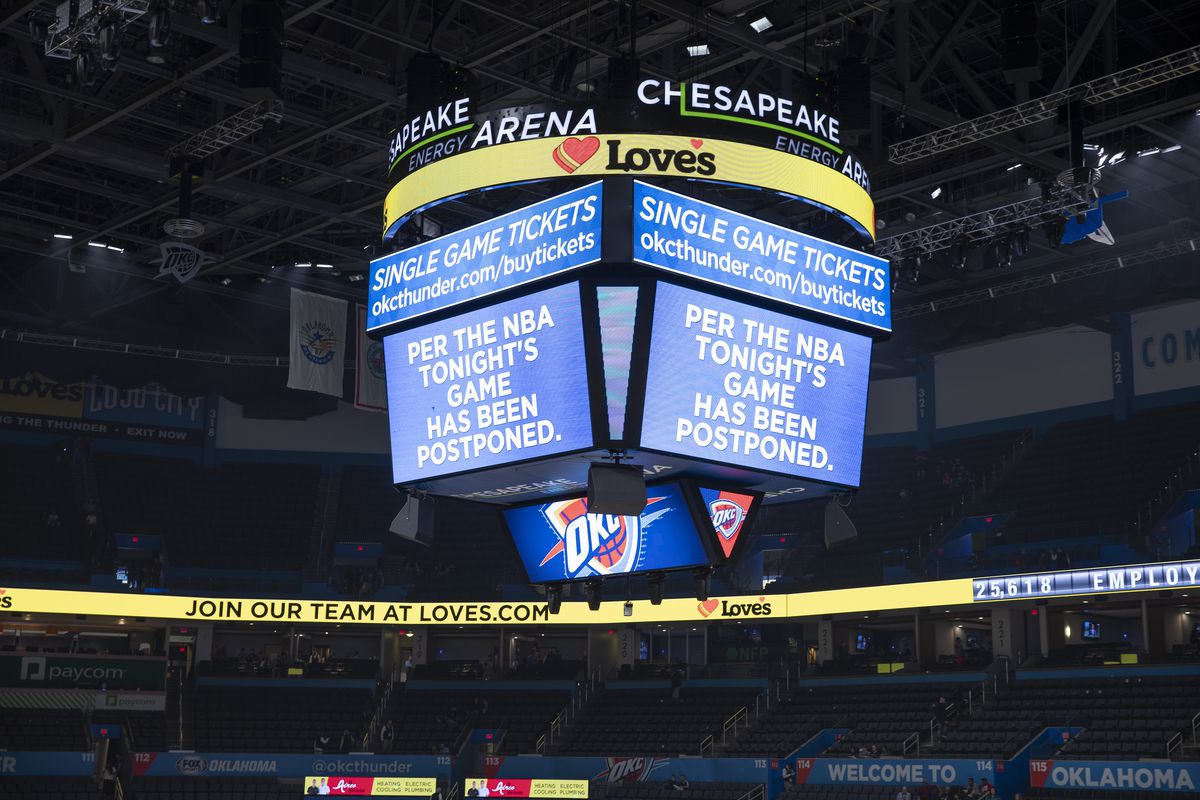Silence.
No basketballs being dribbled, no soccer balls being kicked across fields and no fans erupting into boisterous cheers.
On March 11, 2020, everything went silent—at least, everything in the sports world went silent.
My boyfriend and I walked into the Chesapeake Energy Arena expecting to watch the Oklahoma City Thunder play the Utah Jazz. With the effects of coronavirus slowly ramping up, I figured we would possibly be watching the final NBA game of the 2020 season.
Little did I know, we would be watching the end of sports.
The game was delayed.
The half-time act performed.
We sat there with so many questions.
After 20 minutes, the PA announcer read the following statement: “The game has been cancelled. Please exit the arena in an orderly fashion.”
Utah Jazz player Rudy Gobert had tested positive for the coronavirus. Although he was no longer in the arena, all the players and staff had to be quarantined after being exposed.
Leave an NBA game before any basketball was played? I could not believe it. I could not fathom it. We witnessed history and the termination of sports in a mere 20 minutes.
Sports represent a cornerstone of American life and consumerism. The cancellation of the NBA started a domino effect with other sporting events, all NCAA games, the Masters and the Olympics quickly following.
Has this ever happened before in history—on a small or widespread industry scale?
The short answer: yes, it has happened—a lot fewer times than may be anticipated.
The long answer: read more to find out.
The Olympics, an international sporting event which promotes unity and competition, only occurs every four years. Athletes prepare their entire lives to compete, and countries dream of watching them. The first modern Olympics was held in 1896 in Athens, Greece. Since its creation in 1896, the Olympics has only been cancelled three times and paused once.
Three times over 124 years. All three cancellations were due to war. In 1916, 1940 and 1944, the Olympics were cancelled due to World War I and World War II, respectively.
In 1972, after a terrorist attack on the Games in Munich, Germany, the Olympics paused competition for just 34 hours and continued with the echoing statement by International Olympic Committee President Avery Brundage, “The Games must go on!”
On November 1, 1946, the Toronto Huskies played the New York Knickerbockers at Maple Leaf Gardens in Toronto, Ontario. With the Knicks win, 68-66, experts refer to this as the first game for the National Basketball Association. Throughout its years of evolution and competition, the NBA suspended competition several times due to national tragedies, player-business negotiations, and, in very few instances, weather.
In terms of national tragedies, the NBA paused competition three different times following the assassination of Martin Luther King Jr., the Columbine High School massacre and the 1992 Los Angeles riots.
Over the years, the NBA also experienced multiple “lock-out” seasons during periods of business negotiations between players and owners. When an agreement cannot be reached, a lock-out occurs—the players refuse to play.
The NBA has experienced four lock-outs. Two lock-outs occurred in 1995 and 1996. Both happened before the start of the respective seasons, leading to zero effect on games.
On the other hand, in 1998, the lock-out spanned more than six months, resulting in a shortened season from 81 games to only 50 regular season games.
Most of us probably can recall the most recent lock-out. In 2011, we went over eight months without basketball, resulting in only 66 regular season games.
And the basketball keeps bouncing to one of the biggest, most lucrative sports tournaments in America: March Madness. My personal favorite time of the year gone. No brackets. No upsets. No Cinderella stories.
March Madness becomes March Sadness.
Has March ever been this sad before?
Nope. March Madness has never been cancelled since its inception in 1939. Never. Eighty-one years the madness has roared.
Basketball cancelled. Olympics cancelled. Tennis could go on, right? Players are more than six feet away. Just limit fans, right?
Wrong.
Wimbledon, or The Championships, stands as the oldest tennis tournament in the world and is regarded by many as the most prestigious. Wimbledon has been played in Wimbledon, London, since 1877.
Over those 143 years, Wimbledon cancelled once—during World War II in 1945. According to ESPN, this year’s cancellation was “the first time since the tournament began…that the event will not be played during peacetime.”
Throughout all my research, I only found one sport cancellation due to disease outbreak: the 1919 Stanley Cup Finals. The Montreal Canadiens and the Seattle Metropolitans were tied 2-2. A champion was never crowned after the cancellation of the series due to a flu epidemic which killed 30 million people worldwide.
After reading all that one thing reigns true: we are currently experiencing history. Cancellations of this scale have never—let me repeat—never happened in history.
While this may not be the history any of us wanted to experience, we do not get to choose the time we live in.
We do get to choose the stories we create within those times.
Sports may be cancelled, but we can still exemplify our human courage, strength and unity during this time.










Be First to Comment